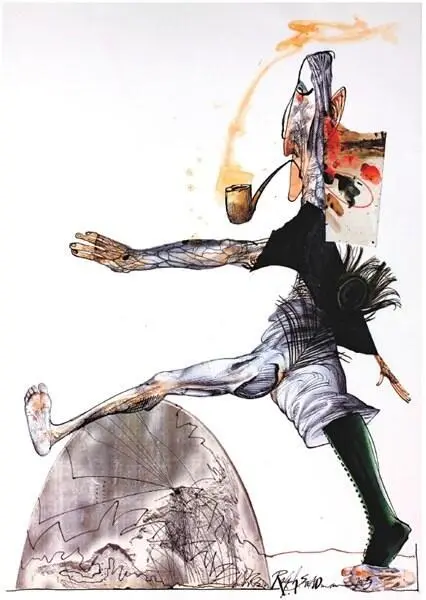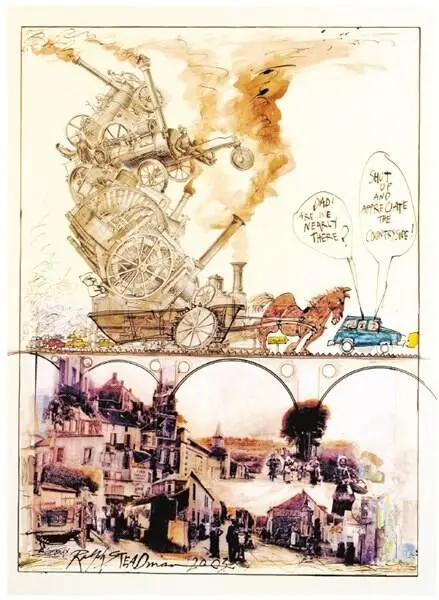
Talking Pages had been absorbed into the great telephone-answering gulag known only as ‘118’, so doubtless my call was answered by a Mongolian former yak herder deep in the Altai Mountains. I pictured the call centre wedged like a corrugated spacecraft in some dusty gully. Inside, bandy-legged men in traditional dress slouched about on leather-covered cushions, watching antediluvian videotapes of Police Five with Shaw Taylor in order to assimilate the social mores of telephone banking customers in the Potteries. A once-proud nomad doing a passable imitation of a Staffs accent gave me a choice of three minicab companies which served the Lewes area.
Naturally the first two I called turned out to be located in Brighton, despite their Lewes exchange numbers. And, no, they couldn’t answer my distinctly local enquiry about the time it takes to drive to Southease. The third company was different. They were located right inside Lewes Station, and, yes, they knew the area intimately. The controller spoke as if every one of his drivers had — like some humanoid nematode — filtered the very earth of Sussex through their bodies. The controller assured me the drive would take mere minutes, so I booked the cab.
The next morning was bright and clear. Sunlight flashed off the braces of orthodontically challenged teenagers who boarded the train at Plumpton on their way to school in Lewes. After detraining, I was so high with anticipation that it wasn’t until the cab had gone about two hundred yards in the wrong direction out of Lewes that I pointed it out to the driver: ‘I want to be on the east side of the Ouse, at Southease Station.’ ‘No problem,’ he breezed, ‘I’ll drop you down a track on this side and you can cross the river on the swing bridge.’ Then he went on about his childhood, engendering such a warm feeling of mateyness in me that I overtipped the sly fellow.
In fact he’d dropped me outside Rodmell, more than two miles from where I wanted to be. As I puffed along the track, my pipe sending up great clouds of smoke from the Presbyterian tobacco stuffed in it (a blend introduced to Stanley Baldwin in 1923 by the future Moderator of the Church of Scotland), I saw in the mid-distance the little two-carriage train stopping at Southease Station. Now, no matter how hard I walked for the rest of the long day, I would still be lagging behind. The sinuous downs, the soaring Seven Sisters, majestic Beachey Head, all of them suddenly concertinaed into the space between two low-firing synapses in the lazy minicab driver’s mind. Machine Matrix 1, Psychogeographers 0. I could hear Durkheim’s low and evil laughter in my inner ear. Not a pretty sound.
It’s worth considering that the first theoreticians of the railway saw rails and locomotives as essentially component parts of a single machine. The patents lodged in the early years of the nineteenth century were for rails with projecting ‘teeth’ which meshed with cog-wheeled engines. Initially it was thought that smooth steel wheels on smooth steel rails simply wouldn’t provide the necessary traction, but even when this was proved wrong the French coinage ‘chemin de fer’ still caused problems for Gallic late adopters: ‘Ils y en croient que ces routes sont pavées avec des plaques de fer,’ wrote one bemused commentator in 1820, ‘mais ce n’est pas cela du tout. .’
Others first saw the revolutionary transport system as an evolution of existing roadways. In 1802 Richard Lovell Edgeworth published the first proposal to construct railways for public transport. He envisaged rails implanted in the highways with heaviest traffic, which would be supplied with cradles on to which existing carriages could be lifted. These would then be drawn on by horsepower, a principle advantage of the system being the reduction in friction. But in a visionary anticipation of the shape of things to come Edgeworth wrote: ‘The chief convenience of this project arises from the mode of receiving and transporting on the rail-ways every carriage now in use without any change in their structure, so that the traveller may quit and resume the common road at pleasure.’
Well, delete the word ‘pleasure’, elide the Frenchman and Edgeworth, and it seems to me we have a pretty accurate description of the péage autoroutes which a century later snake across France like blue veins through Roquefort. I know, I know, some will cavil that the highway and the vehicle moving on it don’t truly constitute a machine ensemble, because the car is capable of independent motion, but try telling that to a strung-out paterfamilias piloting a people carrier full of enfants terribles from the Dordogne to Calais. Work time, holiday time, both are strictly delimited in the modern era, and all too often the interface between the two is the high-speed motorway drive.

It may be theoretically possible to leave the péage and meander off into the vineyards, there perhaps to seduce a numinous ‘thou’ with a flask of wine; but in practice embankments, cuttings and tunnels eradicate the soft contours of the landscape, while the cogs of the car tyres mesh with tarmac teeth to make 140 kmph forward motion as ineluctable as a funicular. Entrée. . Mussidan, Sortie. . Arveyres, PRIX. . 5.70 euros. The little paper tongue licks the lobe of your ear with its patent insincerity: have you not just been winched over an ancient and venerable monoculture of great sophistication in a steel cask of unspeakable crudity? Are not you and your offspring merely a portion of that great human vendage, whereby the British bourgeoisie are squeezed out in the heart of France in the dying days of August?
St Emilion, Monbazillac, Saussignac. . the great grapes are trampled by the whirling rubber of wrath and stress. Ferchrissakes! We just steamed past St Michel-de-Montaigne without so much as a sideways glance! What would the venerable essayist have made of this? His take on the world was compendious to the point of being encyclopaedic, but the closest he came to penning ‘On péages ’ is his fragment ‘On riding “in post”’. According to Montaigne, ‘The Wallachians. . make the fastest speeds of all. . because they wear a tight broad band around their waists to stop them from tiring, as quite a few others do. I have found no relief in this method.’ Nor me, nor me; even a conventional seatbelt is irksome after five hundred kilometres and a pit stop to peck on a reconstituted prong of pureed pig meat with a 6 euros prix fixe.
Still, at least the kids are holding up well as we whack up the A10 past Angoulême, Poitiers and Tours. Not for them the insistent jibing of this road to unfreedom. My mind drifts back to my own childhood, and family voyages in the Austin to Wales, embarked upon before the construction of the British motorway system. I recall it took days, as my father appeared to have been taught to drive at a purely theoretical level by Jean-Paul Sartre, and so regarded each depression of the accelerator as an existential leap into being. There was snow too, great drifts of it, out of which lorries lumbered looking like woolly mammoths.
My reverie is stirred up and then finally dispersed by the great dark lodestone of Paris. We leave the machine ensemble of the péage , only to be locked into another one: tens of thousands of cars inching forward in near-gridlock. It isn’t until we’ve been stuttering along for over an hour that my thirteen-year-old vouchsafes that this is the day of the European athletics championship. It would be ironic, this joyless driving for hundreds of kilometres only to be held up by people funrunning, were it not that the true psychogeographer never experiences irony. ‘See that,’ says the lad, indicating the fragment of a map Michelin have put on the cover of their France 2003 Tourist and Motoring Atlas, ‘d’you think they’ve put Brest on the front so that they’ll sell more copies?’ My heart swells with paternal affection: a psychogeographer in the making, n’est-ce pas?
Читать дальше














